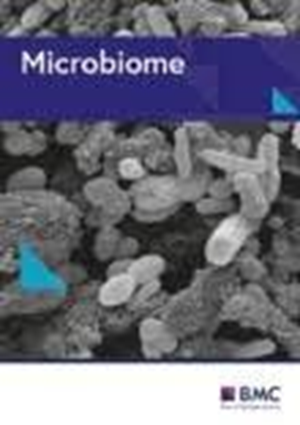出生时的饮食对健康成长至关重要,与对肠道微生物群的影响无关
IF 13.8
1区 生物学
Q1 MICROBIOLOGY
引用次数: 0
摘要
初乳是新生儿的第一口奶。初乳中含有大量可塑造微生物群的化合物,而且在肠道微生物群播种时摄入初乳,这表明初乳可能对建立健康的微生物群至关重要。越来越多的证据表明,肠道微生物群对健康成长非常重要。在此,我们旨在研究初乳和初乳诱导的微生物群对促进生长的贡献。解决这一问题意义重大,因为(1)在全球范围内,只有不到一半的新生儿吃足初乳(2)微生物群对预防营养不良的重要性仅在幼年或成年临床前模型中得到证实,而发育迟缓在断奶前就已经开始了。为了研究出生时的饮食对生长迟缓的重要性,我们开发了一种独特的小鼠模型,在这种模型中,新生小鼠由处于哺乳晚期且不再提供初乳的母亲哺乳。用成熟乳汁代替初乳喂养新生小鼠会导致明显的生长迟缓,并伴有慢性营养不良的生物学特征,如瘦素水平低、血脂异常、全身炎症和生长激素抵抗。我们接下来研究了初乳在微生物群形成中的作用。在哺乳期结束时,我们发现对照组小鼠和被剥夺初乳的小鼠的肠道微生物群α多样性、β多样性和类群分布存在很大差异。为了确定微生物群变化与生长轨迹之间的因果关系,我们在无菌小鼠中重复了我们的实验。在没有微生物群的情况下,初乳对生长的有利影响依然存在。我们的数据表明,初乳可能在预防生长失败方面发挥着重要作用。这些数据突出表明,新生儿肠道微生物组的组合与饮食之间的相互作用对于发育中新生儿的生长控制可能并不像在年轻成人中所描述的那样至关重要。这开启了范式的转变,将促进对初乳生物活性物质的研究,这些生物活性物质在促进生长方面可能发挥与微生物配体相似的作用,并为针对新生儿的发育迟缓预防转化研究开辟新途径。本文章由计算机程序翻译,如有差异,请以英文原文为准。
Diet at birth is critical for healthy growth, independent of effects on the gut microbiota
Colostrum is the first milk for a newborn. Its high content in microbiota shaping compounds and its intake at the time of gut microbiota seeding suggests colostrum may be critical in the establishment of a healthy microbiota. There is also accumulating evidence on the importance of the gut microbiota for healthy growth. Here, we aimed to investigate the contribution of colostrum, and colostrum-induced microbiota to growth promotion. Addressing this question is highly significant because (1) globally, less than half of the newborns are fully colostrum fed (2) the evidence for the importance of the microbiota for the prevention of undernutrition has only been demonstrated in juvenile or adult pre-clinical models while stunting already starts before weaning. To address the importance of diet at birth in growth failure, we developed a unique mouse model in which neonates are breastfed by mothers at an advanced stage of lactation who no longer provide colostrum. Feeding newborn mice with mature milk instead of colostrum resulted in significant growth retardation associated with the biological features of chronic undernutrition, such as low leptin levels, dyslipidemia, systemic inflammation, and growth hormone resistance. We next investigated the role of colostrum in microbiota shaping. At the end of the lactation period, we found a major difference in gut microbiota alpha diversity, beta diversity, and taxa distribution in control and colostrum-deprived mice. To determine the causal relationship between changes in microbiota and growth trajectories, we repeated our experiment in germ-free mice. The beneficial effect of colostrum on growth remained in the absence of microbiota. Our data suggest that colostrum may play an important role in the prevention of growth failure. They highlight that the interplay between neonatal gut microbiome assembly and diet may not be as crucial for growth control in the developing newborn as described in young adults. This opens a paradigm shift that will foster research for colostrum’s bioactives that may exert a similar effect to microbiota-derived ligands in promoting growth and lead to new avenues of translational research for newborn-tailored prevention of stunting.
求助全文
通过发布文献求助,成功后即可免费获取论文全文。
去求助
来源期刊

Microbiome
MICROBIOLOGY-
CiteScore
21.90
自引率
2.60%
发文量
198
审稿时长
4 weeks
期刊介绍:
Microbiome is a journal that focuses on studies of microbiomes in humans, animals, plants, and the environment. It covers both natural and manipulated microbiomes, such as those in agriculture. The journal is interested in research that uses meta-omics approaches or novel bioinformatics tools and emphasizes the community/host interaction and structure-function relationship within the microbiome. Studies that go beyond descriptive omics surveys and include experimental or theoretical approaches will be considered for publication. The journal also encourages research that establishes cause and effect relationships and supports proposed microbiome functions. However, studies of individual microbial isolates/species without exploring their impact on the host or the complex microbiome structures and functions will not be considered for publication. Microbiome is indexed in BIOSIS, Current Contents, DOAJ, Embase, MEDLINE, PubMed, PubMed Central, and Science Citations Index Expanded.
 求助内容:
求助内容: 应助结果提醒方式:
应助结果提醒方式:


